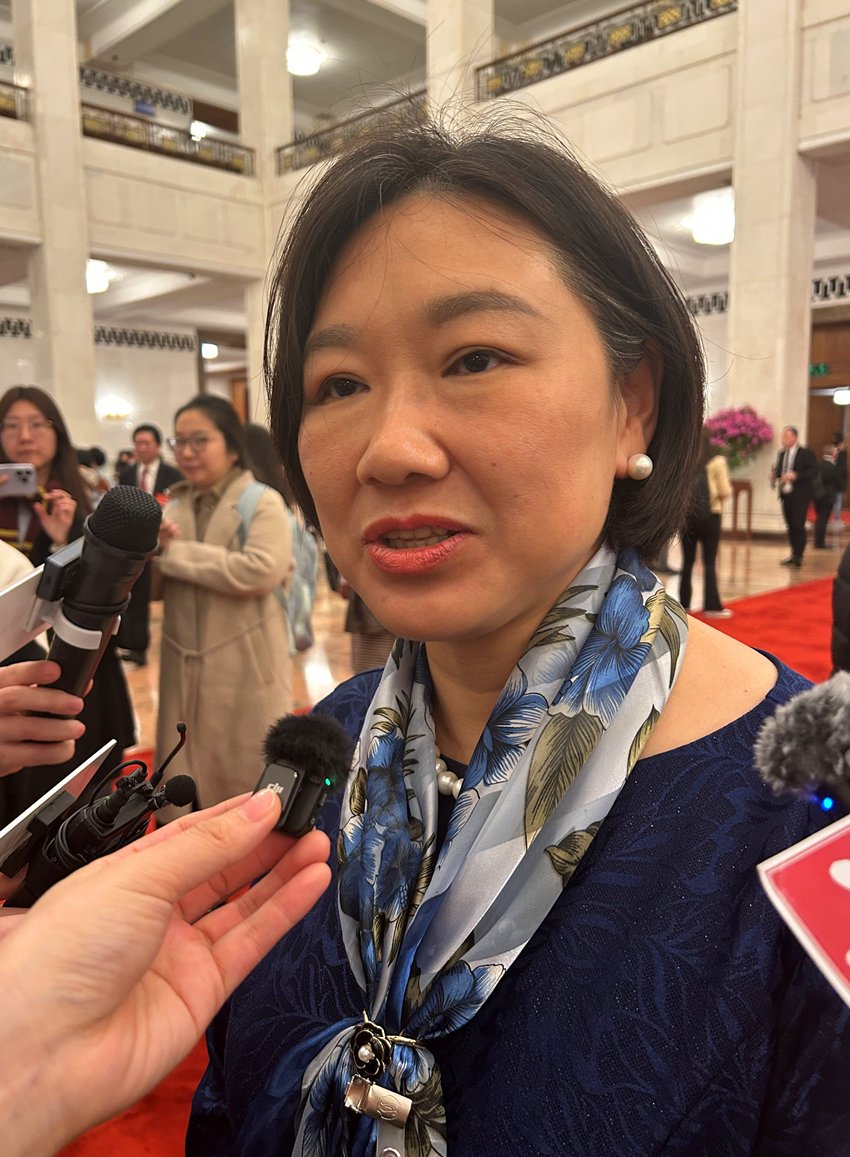
 0 Comment(s)
0 Comment(s) Print
Print E-mail China.org.cn, March 7, 2025
E-mail China.org.cn, March 7, 2025
Jiang Shengnan, writer and member of the 14th National Committee of the Chinese People's Political Consultative Conference (CPPCC), spoke with reporters during a group interview at the third session of the 14th CPPCC National Committee in Beijing on March 4.

Jiang Shengnan, member of the 14th CPPCC National Committee, speaks to reporters at the Great Hall of the People, Beijing, March 4, 2025. [Photo by Zhang Rui/China.org.cn]
As the author of blockbuster online novel "Legend of Miyue" and screenwriter of its hit TV adaptation, Jiang believes that historical dramas serve as an important vehicle for disseminating Chinese culture globally, noting the strong demand in overseas markets.
According to a report by the National Radio and Television Administration released in December last year, period dramas lead the way in overseas revenue, demonstrating strong international competitiveness.
However, there are still significant challenges facing the creation and dissemination of historical dramas: most focus on fictional or fantasy narratives, while those that genuinely embody the essence of Chinese civilization and convey shared cultural memories remain in the minority.
Jiang suggested optimizing the review mechanism and categorizing management to stimulate creative vitality, while also establishing regular and constructive communication between the cultural and historical academic communities to balance creative freedom with a respect for history. She also called for stronger collaboration between universities and film institutions in order to nurture more talented screenwriters and directors of historical dramas.
To foster a thriving production environment for period dramas, Jiang proposed launching a program to annually select up to five outstanding scripts or adaptations showcasing core Chinese values and international potential to receive priority support. She also suggested including exceptional historical dramas in the national key cultural export projects to ensure promotion on global platforms.
Meanwhile, she called for a "government-guided, market-operated" international promotion system, recommending collaboration with mainstream video platforms to create historical drama sections that use algorithm-based recommendations to target overseas audiences. Jiang also proposed organizing international events to showcase excellent historical dramas, building strong cultural exchange brands. Additionally, she emphasized the potential of integrating film and television IPs with the cultural tourism industry.
Jiang stressed the importance of enhancing China's ability to shape global cultural narratives, proposing an international think tank for Chinese historical dramas to unite scholars in outlining core narratives of Chinese civilization and supporting creative projects. She called for strengthening transnational co-productions, creating works embodying Eastern wisdom to foster global dialogue and mutual understanding.
As a renowned writer of online novels, she also proposed establishing a national-level association for Chinese online writers, artists and entertainers to unite, guide, coordinate, serve and regulate the entire industry while promoting self-discipline and rights protection. This initiative aims to drive the high-quality development of online art and cultural creations in the new era and on its new journey.
By the end of 2023, China had nearly 100 million online literature and art workers, including more than 24 million online authors and over 180 million livestream host accounts. Professionals in fields like online music, animation, and film and TV grew by over 15% annually, with the user base for online audio-visual content reaching 1.07 billion.
Go to Forum >>0 Comment(s)